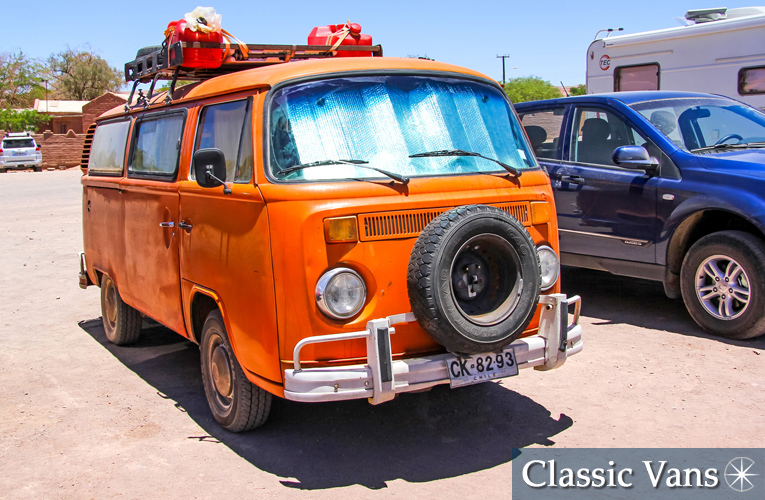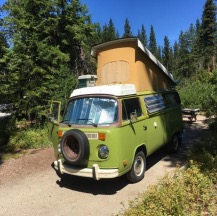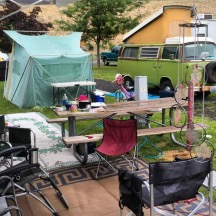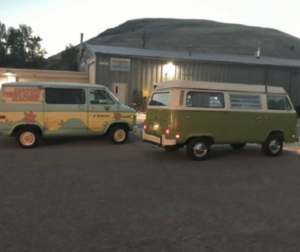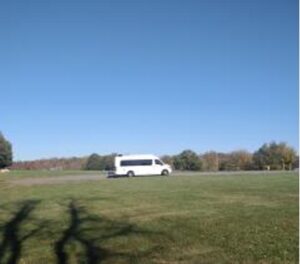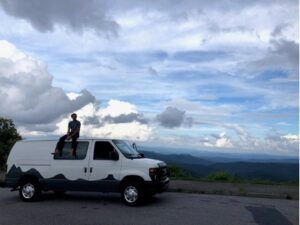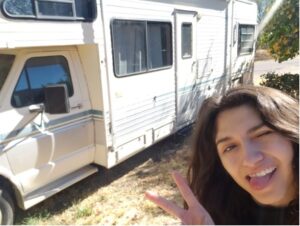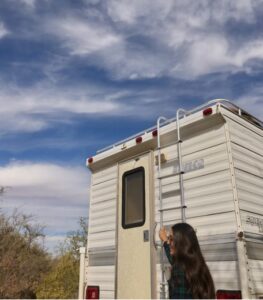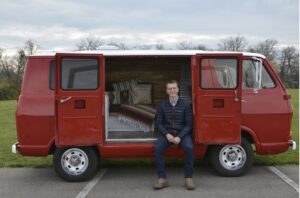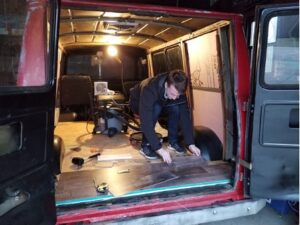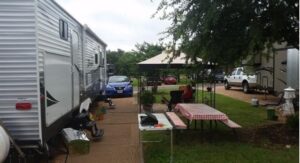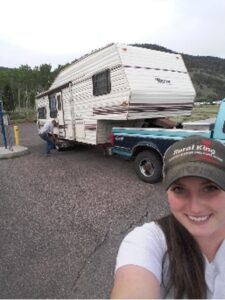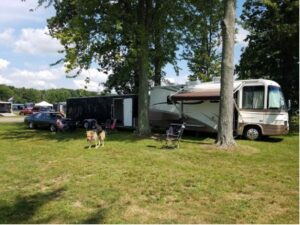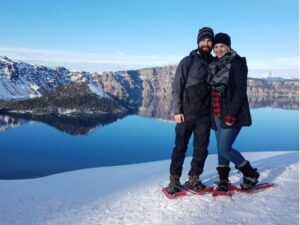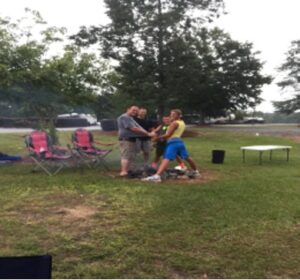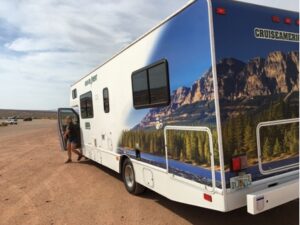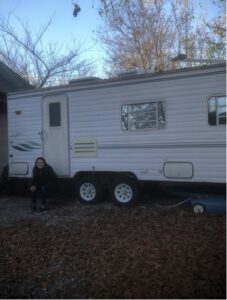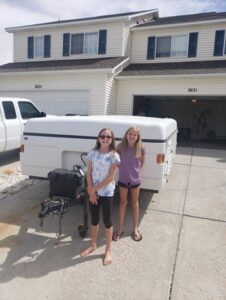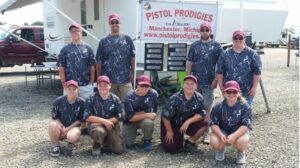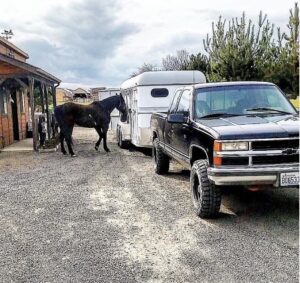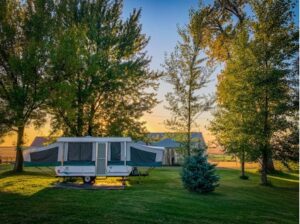Here at Classic Vans, we recently asked the next generation of weekend warriors and full-time travelers to reflect on how RVs and campervans have changed in recent decades (for better or worse) during our 2020 scholarship essay contest. We were thrilled to receive nearly dozens of submissions from students attending colleges and universities all over the country.
Some of the biggest and most meaningful changes that travel vehicles have undergone in recent decades, according to students, were:
- WIFI and internet accessibility
- Interior space
- Creative storage solutions
- Self-sufficiency (off-grid solutions)
- Modern amenities (luxury and comfort)
While we could only select 1 winner for the scholarship award, we wanted to share some of our favorite responses from other applicants. Continue reading to check out the highlights below to see what students had to say, in their own words.
Essay question: How have RVs and campers changed to allow for living on the road full-time?
Bruce Martin, Spokane Community College (scholarship winner):
“The world of RV and campers has come a long way since my ‘79 Westfalia came off the showroom floor. Gone are the days when people took comfort in discomfort. Back then the inconvenience of camping was part of the experience. Aches and pains were part of the fun and cramped spaces made you look forward to going home.”
Madison S., University of the Incarnate Word:
“My dad decided to purchase a Class B RV in the year of 2015, and we traveled to Iowa, the beach, and even just two hour long roadtrips to get away… after 4 years of usage, my dad had to unfortunately sell her… My dad ended up getting a Mercedes camper for quarantine because he knew how much we would need it.
We have been on multiple beach trips, and it is the perfect size for us 5, and newly, a puppy!… I love just getting the night to myself in the camper for when I, or any family member, want a home away from home. I can’t wait to spend the next couple of years with Tiana (yes, the beautiful Disney princess), and all of the new memories.”
Nanette L., Santa Monica College:
“Rather than live with my parents in the same town I had spent the past two decades of my life, I was able to discover so much of my home state California, and even surrounding states. Instead of limiting myself to 1-2 vacations a year, every day was a vacation living the van life. Also, this lifestyle granted me the ability to save thousands of dollars, savings that otherwise would have taken much longer to accrue with the cost of renting.
The newest features of modern day RVs and campers make the van life easier than ever to experience… Now, you can purchase RVs and Sprinter vans that already come equipped with a bed, bathroom, and kitchen. The high top of these models allows for ample standing space, something I would’ve liked having more of in my van life experience.”

“Whereas once vans did not have too many features, now you can find a model without compromising the luxury amenities you would typically find at home.”
Daniel O., University of Houston:
“…the modern RV is equipped with many, if not all of the things a common home has. You want a restroom? No problem, an RV can let you choose from a minimalist design to something a little more fancier. Want a kitchen? Yeah no need to worry about starting another campfire, RVs have space for a functional stove, microwave, and other appliances. Of course, how could I forget about the good old H20. Yep, RVs are equipped with filters and even pumps, which can let you get water from a natural, renewable source. You’re tired and want some shut eye? Well, through some witchcraft, the engineers of RVs can fit a makeshift bed into the wall using geometry. How could I forget, you need some Spotify while you’re on the roads? Don’t sweat it, RV’s have their own wifi and internet included.”
“…I’m sure that the future for these vehicles are bright. So, let’s sit back and watch what RV’s can become next…”
Marieli P., Columbia Basin College:
“Like every invention there are successes and failures, and more importantly, room for improvement. The Modified Model-T Ford Roadster was the first of its type and since then the motorhome industry has become as luxurious as buying a mansion, if not more.
As we know, sleeping in a car is not the most comfortable experience—the average American man is five feet and nine inches tall, not a suitable height for prolonged trips— so as the years progressed so did the ideas. Amenities such as small stoves and ice boxes were implemented into the first Airstream trailer built by Wally Byman in 1929. These models were the first self-contained trailers suitable for long road trips and paved the way for popularization of RVs in the late 1950s. RVs and campers became more diverse in shape and size, yet they continued to hold and serve the same purpose; that purpose being to provide comfortability and luxury for on the road fun.”
Haley B., Cal Poly Pomona:
“Waking up right by the river or in the woods is one of the most relaxing experiences you will have in life. My favorite experience of all was traveling up to the North Fork of the American River and from there heading up to Yellowstone National Park all in an RV. Traveling was great because there was so much room for the long drive and everyone had room to play games or to take naps when they wanted to.
Going on roadtrips in RVs will make your vacation a thousand times better and will allow you to be closer to nature, while meeting some new people along the way.”
Mitchell A., Clemson University:
“RVs used to be known as the retiree’s vehicle and were used for elderly couples to travel the U.S. Today, when I think of a camper, I think of a young adventurous adult traveling the country in their own home-built vehicle where they live, eat, and thrive. I currently live in my van full time, traveling the East Coast while also working part time and taking college courses online.
I am willing to sacrifice the modern benefits of a stationary home in order to wake up every morning in some of the most beautiful places possible. There has not been some new technological marvel in the RV world that has allowed for full-time road living, but there has been an attitude shift about the value of spending time in the natural beautiful world.”
Jacqueline L., University of Arizona:
“My father got this RV around the time I started high school, and our first trip was over the weekend at some lake near Bisbee… We haven’t taken a trip in the RV in over a year, and while all my parents heard were complaints, I certainly miss the thing.
In the future, I wouldn’t mind investing in an RV, maybe a newer one than the one my dad bought, but RVs by themselves provide so much adventure that I laugh at how I thought those trips would be boring as math class in the morning.”
Taylor L., University of Arizona:
“With the world going more online for numerous reasons, you can do classes, attend meetings and complete work all from your RV, as long as you have Wi-Fi. This allows you to fulfill your responsibilities from literally wherever you want. For instance, you could be in Jackson Hole, Wyoming attending a Zoom meeting at 9 am and an hour later you could be hiking in the Tetons. Furthermore, along with workplace flexibility comes financial flexibility. When living in a RV or camper you are no longer paying a mortgage or rent but still have a place to call home. This in turn allows for more unconventional jobs because there are theoretically fewer bills you need to pay, meaning you then have the ability to live on the road full time.”
Karina S., University of Texas at El Paso:
“Many choose to travel by airplane to avoid long drives but they are missing on so many potential memories.”
“I personally prefer a slow-paced life that gives me the time to enjoy it to the fullest. I have traveled to several places by airplane and RV. I must admit that traveling in an RV with my family has been the best experience of my life… Traveling by air gets you there faster but traveling on the road will give you priceless memories. These types of memories will mark you in a positive way for the rest of your life.”
Brayden P., Lindner College of Business (University of Cincinnati):
“One of the most prevalent changes in the camper industry is sustainability. Camper vans have proven to be near 100% self-sustainable. Instead of plugging into a power source each evening, camper vans are now often equipped with solar power. Individuals can park anywhere and work every day on the road with almost unlimited power. In addition, there is no need to find a waste dump station. A camper van can be equipped with a composting toilet in which an individual can dump out their waste safely upon filling. Camping can now be for everyone.
Camper vans are the “activists” of the RV and camper industry. With amenities such as solar power and composting toilets, camper vans have been promoting change across the industry. Now, individuals can live a flexible, adventurous, sustainable, diverse, and free lifestyle by owning an RV, camper, or camper van. Camping is no longer just a weekend festivity; camping is a lifestyle.”
Janet V., Texas A&M University:
“We stayed in an RV resort for eleven months while finding the town in which we would plant our roots. Without the modern advances of our RV, our living situation would not have been so manageable. Inside of our travel trailer, we had beds, couches, television stands, a full kitchen (minus a dishwasher), a bathroom with a shower/bath, and heating and air conditioning.
Where they used to be for temporary getaways and secluded weekends, you can now pack up and leave and live in them long term… With the comforts that they now offer, if you want a more nomadic lifestyle, you’re able to do that all within the comforts of the 21st century.”
Kayla M., Western Governors University:
“Growing up in a small town in Utah, spending every weekend in a camper up in the mountains became my second home and created cherished childhood moments. I have fond memories of a deck of face cards spread out on the fold out table and laying on the pull out couch listening to rain drops softly drop on the tin roof of my families old white and grey 20 foot tongue pull. Now that I am an adult, camping is still a loved activity that I now share with my husband.
Not only did [our trailer] offer us beloved vacation memories, but it also offered us shelter during an exceedingly difficult time in our life. In 2018, the Pole Creek Fire blazed through central Utah. In its path, sat our family farm and our little home. Without warning the fire burned through our farm taking with it storage sheds and an old camp trailer. As it traveled it became more and more of a threat to our home. As the fire came over the hill just a couple hundred yards behind my house, I began to realize that it was probably going to take my house and all my belongings. With little chance of the fire stopping, I began loading my possessions into our camp trailer. Pictures, clothing, irreplaceable possessions, and other loved objects covered each surface of the trailer. We made it out just as the fire overtook the fields behind our house. Over the next two weeks, our camper played home to us and our 2 dogs as we wondered if our house would make it. Gratefully for us the fire came to a stop 40 ft from our small house and we were able to return home. At the time, we were sure we were going to lose everything. Had it not been for that old peeling Sierra hooked up to the back of our truck, we would not have been able to take with us so many precious items and they may have been gone forever.”
“Whether they’re used to go on an adventure, offer a permanent home or shelter you during difficult times, campers and RVs will continuously be second homes to us.”
Alicia M., Wayne State University:
“As time progresses, the draw to non-conventional living situations have become more popular. People have been drawn into the ideas of being on the move and seeing the landscapes, not being tied down. People have also realized they can live in frugal luxury by way of living a van life. RVs have developed in such a way as to cater to almost any lifestyle. There are vans that are the vehicular transport itself, illuminating the need for heavy-duty trucks to haul the RV. Many vans have a pop out feature to create more space within the van. This is ideal for families. They also have restrooms, showers, electricity, gas lines, a few options for sleeping arrangements. This has made it easier for people who want to live a life of adventure not have to sacrifice having a family. This also made for bigger families to be able to have creative forms of vacations… Some RV’s have satellite and WIFI connectivity too so the privileges of modern life doesn’t have to be sacrificed!”
Hunter W., Ohio State University:
“Having a camper in my family has allowed us to stay places in a second home. Campers are known as a second home or a home away from home and if you allow yourself to make that adjustment you can find yourself very comfortable in a camper and can enjoy the outdoors and the company of friends and family wherever you park it.”
Sarah H., Colorado State University – Global Campus:
“There are many features that offer efficiency for a nomadic lifestyle such as solar panels, compact but fully functional kitchens, and innovative storage solutions. The advancement of vehicles available for mobile living are not the only changes that have made this lifestyle possible for many people; in recent years, work-from-home jobs have gained popularity which has resulted in more opportunities to have a stable career while living on the road.”
Mackenzie M., University of Missouri:
“My one dream is to travel the United States over the summer with my friends in it. The RV will provide me all the necessities such as a place to stay, store food, etc. as well as form cool experiences that can’t be recreated any way else.
Overall, traveling is becoming more appealing to the Generation Y and Z. While it can be expensive with flights, hotels, and food, driving in an RV can make it cheap and cut costs. I’m so excited to travel the United States over the summers to come while I’m not in the workforce and have free time. One day, I hope to take my family camping and on road trips. Traveling in our RV will make this easier and more realistic.”
Cameron F., Southeastern Baptist Theological School:
“Living and working in a campground, I saw a variety of lifestyles, small and big campers, tents and tiny homes. I met people from all over the world, each came from different walks of life but shared in the same interest, traveling the country in an RV or van.
The experiences we have when traveling, especially in a RV or van, create the most beautiful memories. During my time living in the camper, I developed a belief that everyone looking to travel the country affordably should invest in a camper. When taken care of, these homes on wheels can last a very long time.”
Julianna I., D’Youville College:
“I think whether you are using an RV or camper for work or for travel they are efficient, and you can always have a perception of home wherever you go.”
“My family and I traveled to various National Parks through Utah and Nevada and it was a wonderful experience to spend every moment surrounded by nature and with my family by my side. Some of the beautiful parks we visited were the Arches, Grand Canyon, Bryce Canyon, and Lake Powel. We saved a lot of money as well by cooking our own food in the RV and staying at either free land or at an RV park rather than hotels.”
Cadee B., Oral Roberts University:
“Campers and RVs have changed into a small home. The first RV would be considered a wagon that would carry themselves and their belongings from home to home. I am so glad that RVs have changed because I could not live in a wagon! Now, we have whole kitchens and living spaces in them. It is crazy to see the difference from the first camper to todays. They have changed for the better. It is easier now to live in a camper full time than before. Campers have full water and electricity to hook up for your convenience. It is incredible what they can put in such a small space. They have everything you could ever need in a camper now. RVs and campers have made living full-time on the road a delight.”
Ariel H., Western Governors University:
“My parents, family and myself have owned many campers throughout the years. My parents have bought a new camper almost every year that works better for their lives. They have gone from vans, motorhomes, pull behinds and huge 5th wheel campers. Each one serves a purpose. The newer ones have become a lot more usable during all months including the winter to hold in the heat they have extra insulation and piping so that things don’t freeze and so neither do the owners. Some even have washer and dryer and dish washers to be self-sufficient. Some of the newer RV and vans are also super eco-friendly and able to live in full time and travel the world in.
When my kids get out of school, I would like to be able to stay in an RV and drive down the coast of California and stay at the RV parks that are right on the beach. After that I would continue around the United States south and head to Texas and around to Florida—eventually with the goal to find my retirement home area.”
Leticia G., Texas A&M University:
“Motor homes have changed from being a small vehicle with only small sitting areas to being larger places with most amenities available in a foundational home; having restroom facilities, with complete plumbing, large living areas and in some cases even electricity. Some people who have chosen to live a less complicated lifestyle or a minimalist lifestyle as well. Some people have chosen to downsize, even further, and have utilized social media and refurbished larger vehicles into traveling homes also complete with all the amenities and luxuries that fit their lifestyle and meet their needs, leaving them free to travel and experience life on the road.
Travel homes are unique and special in such a way that it allows people and families to gather together and learn about each other, and travel together creating memories and experiences—experiences that long after the trailers have gone on or been handed down bring a smile to our faces, and warm our hearts.”
Braden O., Western Michigan University:
“My family has had a travel trailer since I was a child and all of my favorite memories include camping. Over the years, we have continually upgraded our camper to include more amenities. Our first upgrade provided a toilet in our pop-up and the second upgrade provided air conditioning. Our last upgrade was huge—a 30’ travel trailer that included a bedroom, bathroom with shower, kitchen, television, and sitting area.
In the summer of 2015, inclement weather delayed the completion of our new home. We lived full-time in our camper from April until December. The amenities that are now available on campers allowed us to live comfortably until we received occupancy approval to move into our new home.
Upon retirement, my parents want to upgrade to a recreational vehicle and visit as many state and national parks as possible. Without the changes that have been made in campers, the dream of continual travel would not be possible. I just hope they will leave the travel trailer with me so I can make memories with my future family.”
Maxwell W., Southern New Hampshire University:
“RVs allow for the convenience of bringing your home with you. If you are a nomad, you hook up at an RV park and travel. It makes it so you aren’t stuck to one location. RVs now have generators and can also have propane tank hookups for gas stoves and water heaters. This allows for even more versatility if you want to go completely off the grid with the RV being able to self-station itself without having to be connected to the grid or a water supply. RVs have truly let people live on the road for the better and allow people to be able to travel more comfortably.”
Elise K., University of Southern California:
Technological innovations that allow vans to have internet connections have made van life more accessible, opening up new opportunities for everyday people to live their travel dreams. A modern van build isn’t complete without wifi. There are tons of options for staying connected on the road — options van lifers couldn’t dream of even ten years ago. Many vans come with in-car wifi, and those building on their own can opt for a mobile hotspot booster to use and connect. Staying connected allows those living on the road to stay in contact with distant friends and family, work anywhere they have a signal, and travel without sacrificing the entertainment and knowledge the internet provides, which has made van life more accessible for the general population.
The internet and social media have also made van life significantly easier to navigate. Tools like Campendium — an app travellers can use to find free parking spaces for overnight living — have made van life cheaper and safer. Public forums on sites such as Reddit include tips and tricks for aspiring van lifers, providing them resources necessary to hit the road without unnecessary hassle. With in-van wifi, travellers have these tools available at their fingertips.
“Due to the rise of the internet and social media, people are able to hit the road and soak up the benefits of a travel lifestyle more than ever. The installation of wifi connections in RVs and vans makes life on the road easier and more accessible — meaning more people can live the road lives of their dreams.”
Kyle D., Perry Technical Institute:
“In this modern age people are starting to use campers or RVs for more than just a weekend trip or a weeklong vacation, they are starting to live in them. We are starting to have more and more traveling jobs which require them to be relocated so people are wanting a place of their own they can take with them on the go.
The development of RVs and campers has made travel more convenient and enjoyable and the luxuries are only getting better… I’ve seen things [and] slept in areas I never thought I’d stay and best of all have created memories with family and friends that will last a lifetime thanks to an RV.”
Sarah B., Johnson University:
“RV and campers have changed in capacity and functionality, constantly upgrading to this day to allow more people to feel at ease living on the road. While there are still many challenges and hardships one will face with this lifestyle, it is no less deserving of consideration and certainly no less rewarding than living anywhere else. RV and campers have grown to accommodate bigger families and those who desire more space for storage and relaxation on the road. Space is something the world seems to have plenty of and yet somehow not nearly enough. RV and campers have taken this into consideration when designing the perfect automobile for a family’s road trips and living accommodations.
RV and campers are also constantly upgrading in functionality. Working plumbing, lighting, heating, AC, and other leisure you can find in a house are also found on these drivable homes. Nowadays while living in a RV or camper, you don’t have to worry about what people in minivans or sedans might consider. Not to say living on the road full-time doesn’t come with its own challenges, but it also provides a kind of convenience and freedom you don’t find living anywhere else.”
Erin H., Concordia University:
“We bought a 1995 Coleman Fleetwood Stony Creek and fixed her up so we could enjoy camping this year with our new purchase. Now even though this camper is 25 years old, I know I could still live in this camper full time.
Pop ups have the best of both worlds, where you can take in down for the day and travel to a new site or you can leave it there but enjoy using your vehicle for the day. The best thing about being able to travel from place to place is knowing that you are able to see different parts of the country in a way that is affordable and still have a place to stay without having the ties to living only in one place.”
Think you have what it takes to win our next scholarship contest?
We’d like to give a huge shout out to all of the students who participated in this scholarship contest, particularly those who shared photos of their travel rig. Keep adventuring and best of luck on your education journey!
Are you currently enrolled in an American college or university? If so, and you are interested in participating in our next essay contest for a chance to win a $1,000 scholarship, we invite you to come back soon and visit our Scholarship page to see the next essay question and submit your entry.

Learn all about the #vanlife movement, including the pros and cons, as well as tips and tricks for becoming an awesome vandweller.

